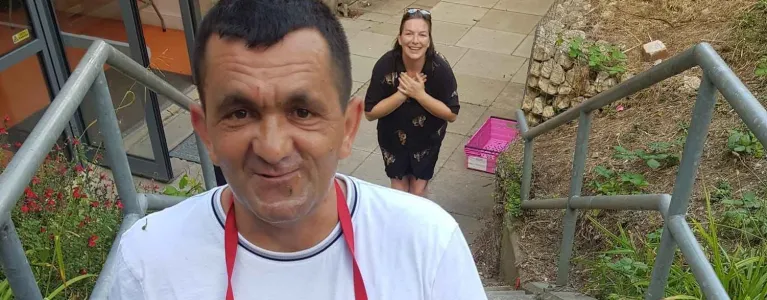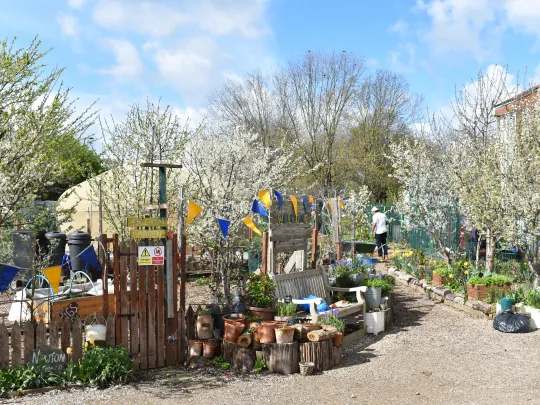
For Creative Health and Wellbeing week, we look at some great initiatives happening across London.
Creative health examines the effects of creativity on health, including how creativity, the arts, heritage, connection to nature and connection with others spark alterations to a person’s or a community’s neurological, biological, psychological and/or social health. Researcher and academic Tamsin Youngson explored various models used to deliver this in London. As part of her dissertation for an MA Sc Creative Health at UCL, she visited projects on the ground and shared her findings with us.
Sufra NW London is more than a food bank. The Brent-based organisation addresses both the causes and consequences of extreme poverty, homelessness and social isolation in the community. Their emergency interventions and innovative courses provide a lifeline to people in crisis – empowering them to improve their wellbeing, learn new skills, find work and become financially stable.
The organisation works with social prescribers; recommending guests to be socially prescribed and having people recommended to them. Tamsin visited Sufra’s lively edible gardens and community kitchen, to find out more.
The food bank runs on efficiency, communication and teamwork, whereas the garden works with nature’s calendar, calmness and independent discovery. Simplistically, the difference in delivery could be interpreted as the food bank addressing the consequences of poverty whilst the garden deals with the causes. However, they each address both. The food bank organises the community kitchen that supports social cohesion and offers a point of contact for signposting. The garden improves guest’s moods, provides work experience and spaces for storytelling, develops independence skills and coping mechanisms, diminishes stigma and promotes social cohesion. One staff member spoke of the garden’s ability to provide upstream solutions to poverty, “It’s a slow way to improve people’s lives but it works better than only giving them food during crisis”.

Sufra's community garden in full bloom.
When entering the garden, I found a staff member leaning over a fence post speaking to three children. The staff member asked them to find potatoes, grapes and courgettes somewhere within the garden. The children awaited further instructions or permission to get going and the staff had to explain that they didn’t need permission to explore this garden.
Tamsin shared some key findings from her research with us:
Blurred Boundaries
The lines between the food bank and the garden are blurred in some places; food grown in the garden comes to the food bank, waste from the food bank is composted in the garden and used to grow more food. However, there is a distinct divide between the two. The building and the garden are divided by a nursery and it would be possible to engage with one and never know the other existed.
People move between being a guest or a volunteer, some inhabit multiple roles at once and others progress from one to the other or fluctuate. For example, one participant found Sufra as an asylum seeker who needed support and subsequently became a volunteer.
Diversity at its Heart
None of the participants Tamsin spoke to had heard of the term creative health, but all had clearly engaged with it, understanding quickly what it meant. The lack of awareness of creative health didn’t diminish its effects.
One staff member believes that connection to nature allows people to “be a part of nature”, or “slow down the hamster wheel in their head”. They spoke of the removal of stigma, describing a person who came into the garden after leaving a mental health treatment centre and sat and spoke openly about it to a table of strangers. Tamsin discovered that the table was where participants and staff heard stories from around the world. Participants described it as a place where “diverse people gather, that TV tells us can’t get along, sitting in a circle, talking.” The garden is intergenerational. Parents and children are regular users of the garden and explore it together - all enjoy discovering the chickens’ eggs.
The immensity of nature is recognised, meaning everyone in the garden is a learner which diminishes the power imbalances of age and experience. The staff, the volunteers and the guests alike are from a variety of heritages and faiths. This is possibly because Sufra is an inclusive place but could also be that global majority populations are disproportionately affected by poverty and therefore are more likely to need Sufra’s aid or wish to help.
Sustaining Continuity
The volunteer who greets guests at the door and arranges their food and toiletries has developed relationships with the guests. They have learnt their names, food preferences, dietary requirements, how many children they have and which nappy size they need. The efficiency of the food bank does not preclude personable and respectful delivery, but rather relies on the building of relationships over time.
To continue its work, the organisation has always had to focus on fundraising. Sustaining activity is reliant on the fact that they are “constantly putting in bids”. Sufra receives a lot of community support and has some long-term donors, but it lacks multiyear funding which would enable them to plan further in advance. This confirmed Tamsin’s findings that creative health sector needs long term and predictable funding to provide the best services.
The Mayor's Health Inequalities Strategy sets out his plans to tackle unfair differences in health to make London a healthier, fairer city. The Healthy Communities aim in the strategy - London’s diverse communities are healthy and thriving - commits to social prescribing becoming a routine part of community support across London.